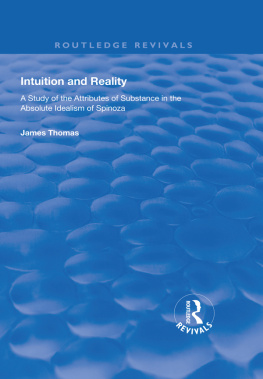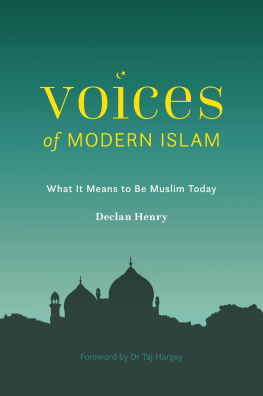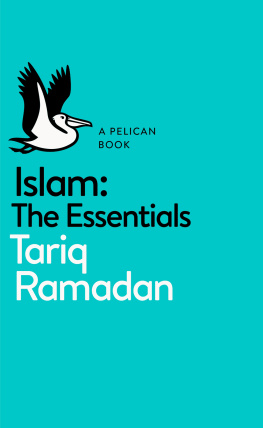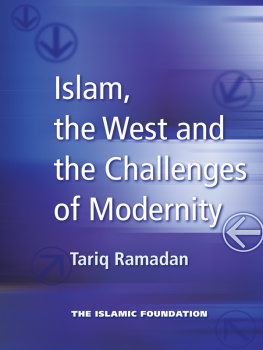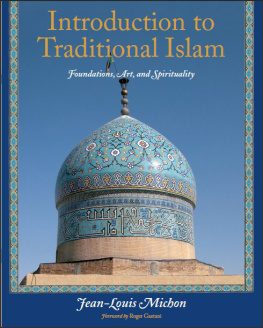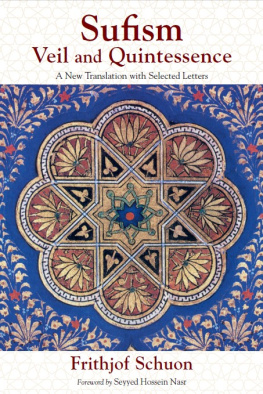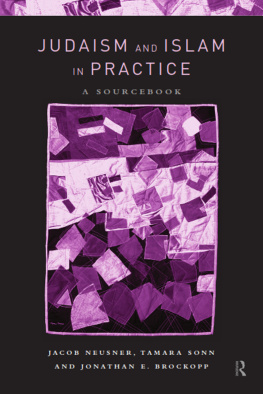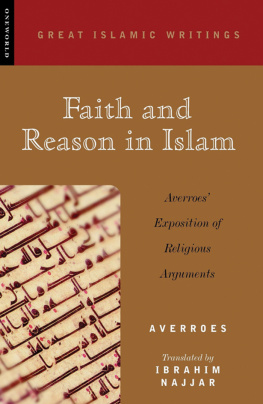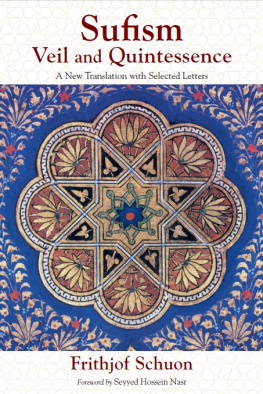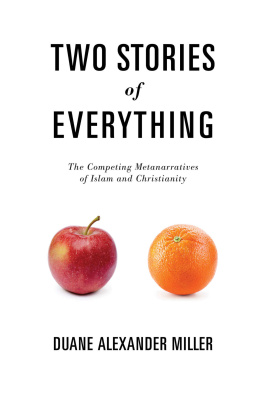APPENDIX
Selections from Letters and Other Previously Unpublished Writings
The peculiarity of Muhammad is to be the synthesis of all spiritual possibilities; this makes his image, as seen from without, somewhat unintelligible, compared with the formal unequivocalness of other prophets; Muhammads unequivocalness lies precisely in his many-sidedness. Christ represented quite unequivocallyin relation to the Jewish cult of the Lawspiritual inwardness; and therefore he has this meaning for the Sufis also; he is the Prophet of the Heart, not of outward works; and Mary has the same meaning, with this difference that she founded no religion and is Mother of All the Prophets, hence well-spring of all the religions. The image of the Prophet is clear and unequivocalprovided one has the key to itinsofar as he is an open fan of all the virtues.
The Message (Rislah) of Christ is the Gospel and the Eucharist, then His Name. The Message of the Holy Virgin is her Son; not the Message of her Son, but her Son in Himself; now this Son, viewed outside of His Message is the Logos as such, which is represented by the Child Jesus; the Logos-Child being the Logos in itself. To say that the Virgin is the Mother of the Logos in itself, of the Logos viewed before or outside every articulated Message, is to say that she is the Mother of all the Prophets. For her Son, not yet being such and such a Prophet since he had not yet articulated a Message, was all of the Prophets, or the Prophet as such.
Every law-giving Rislah is a Message of Truth. The non-formal and non-law-giving Rislah of the Virgin is a Message of Sanctity: or rather, it is the Message of Sanctity; of the Sanctity which coincides with non-formal, essential, primordial Truth.
I could be asked this question: how could a Catholic, even an esoteric one, accept the intrinsic orthodoxynot extrinsicof Protestantism? And someone could ask, with all the more apparent reason, this other question: how could a Catholic accept the intrinsic orthodoxy of Islam? Because Islam rejects Christianity, just as Protestantism rejects Catholicism, but even more fundamentally so; and if esoterism allows one to understand why and how Islam can do this, then esoterism allows one also to understand why and how Protestantism can do so likewise, mutatis mutandis.
Obviously the artistic (not merely pictographic) representation of living beings cannot be primordialthe Native Americans have no images of the godshowever, it is esoteric by nature, and precisely because of this, a two-edged sword; what is equally obvious, late Semitic iconoclasm is a priori exoteric, but it nevertheless recreates a primordial state, and in this way expresses the Religio Perennis; and thus, however contradictory it may sound, there is no profound opposition between Islam and a pictorial art that is esoteric; thus the two are compatible on the plane of esoterism if circumstances permit or demand it. The painting of the Iranian and Indian Muslims proves this in its way.
God is the Sovereign Good, and this Goodthe Good in itselfis absolute and infinite. This supreme truth is to be found inscribed in our immortal spirit; but exteriorized man has lost the immediate access to his spirit. That is why he has need of revelation and teaching, hence of lights coming from without.
The Reality of God produces in us Certitude and Serenity; the latter being the irradiation of the former. Serenity is to Certitude what Infinitude is to Absoluteness.
The Certitude of God produces as its effect the Certitude of Salvation; for knowledge of the Sovereign Good in a certain manner encompasses the soul in this Good, as light encompasses the mirror which it illuminates. Moreover, the unicity of the object demands the totality of the subject; our Certitude must reside in our heart, and consequently it must encompass our entire being; the result of this is virtue. The Certitude of God produces Serenity in God, and at the same time demandsor entailsvirtue, namely, conformity of the entire soul to the Truth of which it is aware.
In a certain sense, Certitude corresponds to the Absolute, and Serenity to the Infinite; in an analogous manner, virtue corresponds to the Sovereign Good.
Since the Certitude of God must be situated in the heart, and in consequence must encompass our entire being, for that very reason it gives rise to virtue and also, and even above all, to love of virtue; all the more so, that without virtue there could be no Certitude of Salvation. Without virtue, the heart is absent, and in the absence of the heart, there could be no question of Certitude of Salvation.
It is indeed marvelous that Certitude of Godspringing either from Gnosis or from Faithimplies Certitude of Salvation, which it does to the extent that Certitude of God is sincereand consequently rooted in the heartand that it gives rise thereby to virtue.
Knowledge is at once inexpressible and expressible; to deny the second term would amount to saying that no metaphysical doctrine is possible, that the only doctrines possible would be theological speculations, namely those marked by a passional element and which therefore are not disinterested, as Gunon would say. That the most rigorously metaphysical doctrine is not supreme knowledge as such, no one will argue, but this could not mean that short of this doctrine there are nothing but speculations of a confessional type, or let us say metaphysical speculations that are more or less subject to the directives of theology, and to the psychology resulting from it. The theological limitations for which I reproach some Sufis are not reducible to the natural and therefore general limitations of human language, otherwise any language possible would be theological; in a word, to reproach a Shankara for the limitations inherent to language, which he has to make use of on pain of not being able to express anything at all, would amount to reproaching a man for being a man.
Someone who is purely and simply an exoterist has no choice but to accept, at the risk of heresy, some errors or half-truths that are providential; he will accept them in the context of a fundamental and compensatory truth. These canonical errors are never gratuitous, they are functional or, in other words, their reason for being is to ward off dangers that are likely or certain to happen, given the collective nature of the human recipient; in that sense, they are indirectly and symbolically truths, at least de facto. Be that as it may, there is no right superior to that of the truth; this amounts to saying that an esoterist is never obliged before God to accept points of view he knows are false, were it even a canonical point of view; I mean: to accept them with respect to their falseness, for he can obviously accept them with respect to their symbolism and their role, but this reduces everything to a question of terminology. A religion is an upya, a salvific mirage or a divine means; however no religion can do without some defect, and the esoterist cannot be unaware of this; the proof of this defect or of this error, if one may say, being precisely the quasi-canonical obligation to revile the religion of ones neighbor.
Ghazzali points out that God creates bad things for reasons unknown to us and does so with wise intentions; Ashari and Ibn Arabi would say that these things are intrinsically good since God created them, which is plausible from a certain point of view, but which nonetheless robs words of all their meaning. I have dealt with this matter in more than one book; what this comes down to is to know where one draws the line between the form and the essence of a thing or a being; what always remains good in phenomena is obviously their existential substance, then their positive qualities, their faculties of understanding, sensation, and action if we are talking about creatures, but not necessarily their characteristic particularities. Evil is not transcended simply because one denies it; God could not ask this of us.


